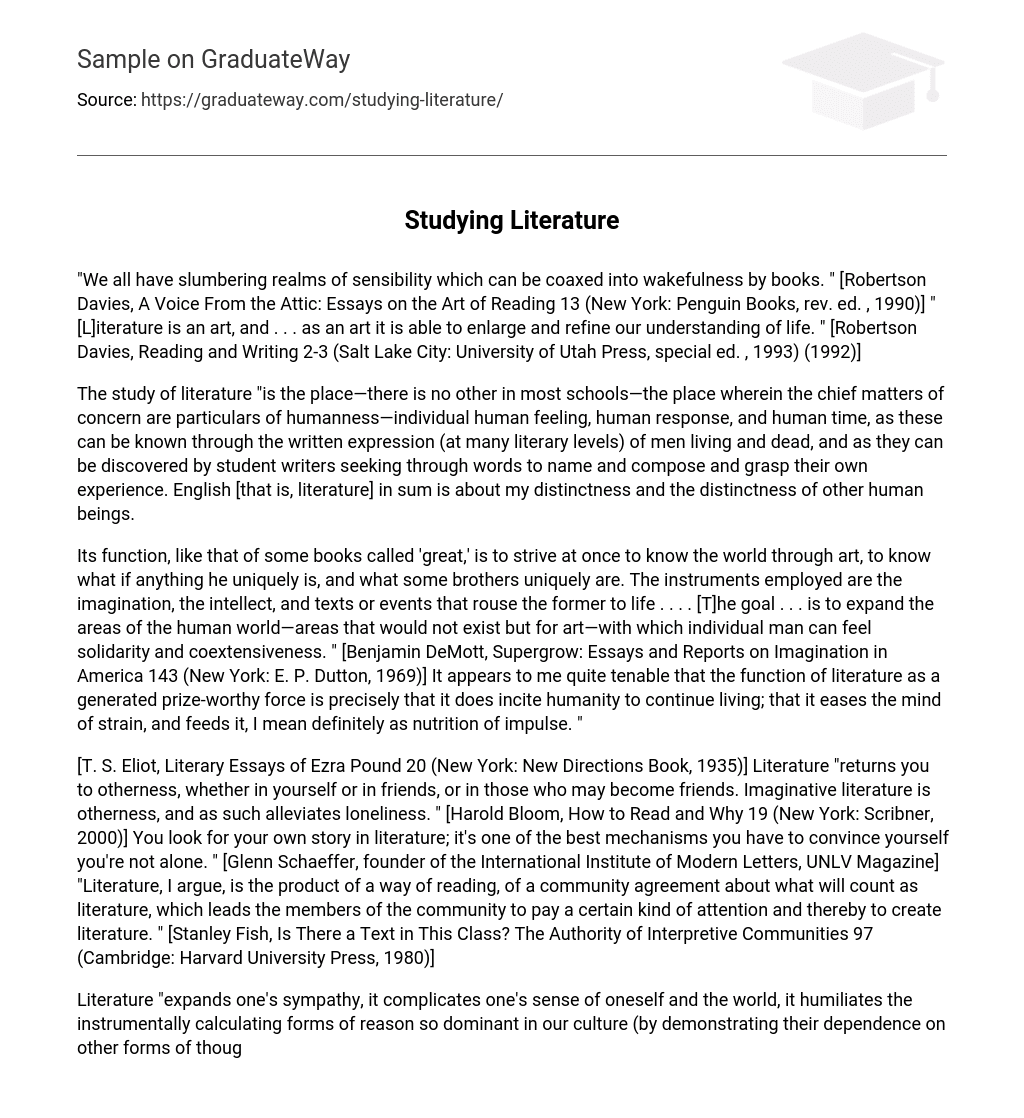“We all have hidden depths of sensitivity that can be awakened through reading.” [Robertson Davies, A Voice From the Attic: Essays on the Art of Reading 13 (New York: Penguin Books, rev. ed. , 1990)] “[L]iterature is an art, and . . . as an art it has the power to expand and refine our comprehension of life.” [Robertson Davies, Reading and Writing 2-3 (Salt Lake City: University of Utah Press, special ed. , 1993) (1992)]
The study of literature “is the place—there is no other in most schools—the place wherein the chief matters of concern are particulars of humanness—individual human feeling, human response, and human time, as these can be known through the written expression (at many literary levels) of men living and dead, and as they can be discovered by student writers seeking through words to name and compose and grasp their own experience. English [that is, literature] in sum is about my distinctness and the distinctness of other human beings.
Its purpose, similar to that of certain acclaimed books, is to simultaneously comprehend the world through art, understand one’s unique identity, and recognize the uniqueness of others. The tools utilized for this purpose include imagination, intellect, and texts or events that stimulate the imagination. The ultimate objective is to broaden the scope of the human experience by creating new areas that can only exist through art, allowing individuals to feel connected and unified. [Benjamin DeMott, Supergrow: Essays and Reports on Imagination in America 143 (New York: E. P. Dutton, 1969)] I find it reasonable to believe that the role of literature as an esteemed catalyst is precisely to inspire humanity to persist in living; it alleviates mental strain and nourishes the mind as a form of impulse sustenance.”
According to T. S. Eliot in his book “Literary Essays of Ezra Pound” (New York: New Directions Book, 1935), literature brings you closer to the unfamiliar, whether it is within yourself, your friends, or those who could potentially become your friends. Imaginative literature serves as a means to alleviate loneliness. Harold Bloom in his book “How to Read and Why” (New York: Scribner, 2000) states that literature allows you to search for your own story, providing one of the best methods to reassure yourself that you are not alone. Glenn Schaeffer, the founder of the International Institute of Modern Letters, expressed in the UNLV Magazine that literature is the outcome of a certain way of reading and a communal agreement on what should be considered as literature. This leads members of the community to pay specific attention and ultimately create literature. Stanley Fish in his book “Is There a Text in This Class? The Authority of Interpretive Communities” (Cambridge: Harvard University Press, 1980) engages in a discussion about literature being a product of interpretive communities coming together with a shared understanding and focus.
According to James Boyd White, literature has the power to expand our sympathy, complicate our understanding of ourselves and the world, and challenge the dominant forms of rational thinking in our culture. This is because literary texts raise questions about the nature of language itself, not only the language they are written in, but also any language used to discuss or translate them. White further argues that literary education helps us gain a better understanding of other people and their thoughts, leading us towards different languages, ways of thinking, and imagining the world.
The understanding of language and the mind, which is literary in nature, allows us to comprehend not just “literature,” but all texts in our world [Id. at 58]. Language is essential to literature and to us as well [Id. at 60]. Literature teaches us how to read and analyze various texts and expressions. It leads our attention to the languages we use, the relationships we establish with them, and how we define ourselves and others in every expression [Id.]. Reading involves directly and immediately engaging with language. Discussing what we read enhances this engagement, giving us a greater sense of authority and self-confidence.
As we develop our language skills, we also develop important life skills and find our place in the world of language. Reading and discussing what we read enables us to create our own role in society and become productive members of it. According to Robert Waxler, literature plays a significant role in shaping students’ views of themselves and the world. Parker J. Palmer agrees that the reading students engage in shapes their identity and perception of the world. Literature offers various ways to enhance literacy by providing access to language, reading, writing, shared culture, and self-discovery, as stated by Jean Trounstine. Johanna Shapiro highlights the unique ability of literature to express insights and emotions that may be difficult for others to articulate, as well as giving voice to hidden questions and making the familiar unfamiliar. Furthermore, literature extends beyond ordinary life as an imaginative art form capable of gracefully and subtly conveying truths through narratives, poetry, and theatrical characters.
Both Florence Dee Boodakian, in her work “In Defense of Literature,” and Ilene Durst, in her piece “Valuing Women Storytellers: What They Talk About When They Talk About Law,” emphasize the importance of studying literature, especially for lawyers and law students. According to Boodakian, imaginative acts found in literature suggest possibility, which is a compelling reason to continue its study. Durst further argues that novels are incredibly useful tools for understanding human nature and can be used as a strategy to address the issues associated with legal education and lawyering.





